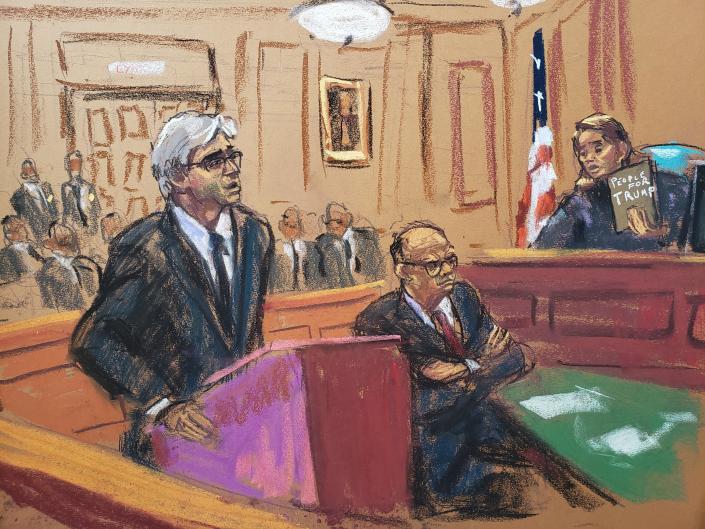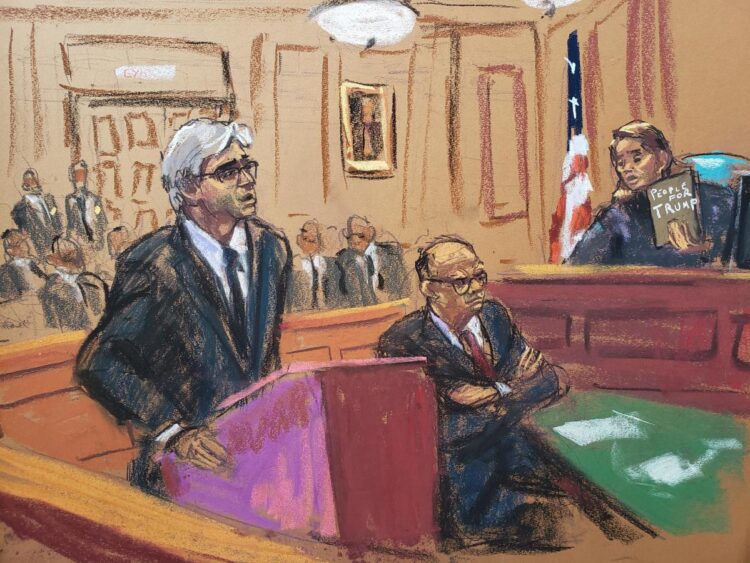A federal judge rejected an effort by Manhattan District Attorney Alvin Bragg to block a Congressional subpoena of a former prosecutor for that office who had worked on an investigation into former President Donald Trump.
Judge Mary Kay Vyskocil ruled that she has no standing to block the subpoena, writing that the House Judiciary Committee has claimed to have legitimate legislative purposes for its inquiry. The committee and its Republican chairman, Rep. Jim Jordan, have aggressively confronted Bragg in the weeks since Trump was indicted in Manhattan.
The Judiciary Committee says it is conducting its investigation in support of possible legislation that would “insulate current and former Presidents from such politically motivated state and local prosecutions.”
“The sole question before the Court at this time is whether Bragg has a legal basis to quash a congressional subpoena that was issued with a valid legislative purpose. He does not,” Vyskocil wrote in her decision Wednesday.
Bragg, a Democrat, has accused Jordan of pursuing the subpoena to score political points while supporting Trump, a Republican.
Vyskocil said the dispute appeared political, but said that did not impact her decision.
“In our federalist system, elected state and federal actors sometimes engage in political dogfights,” Vyskocil wrote in her order, noting that Bragg is an elected official. “Bragg complains of political interference in the local DANY case, but Bragg does not operate outside of the political arena.”

“Jordan, in turn, has initiated a political response to what he and some of his constituents view as a manifest abuse of power and nakedly political prosecution, funded (in part) with federal money, that has the potential to interfere with the exercise of presidential duties and with an upcoming federal election,” Vyskocil wrote.
“The Court does not endorse either side’s agenda.”
At the heart of the dispute is whether Mark Pomerantz, a former Manhattan prosecutor who wrote a memoir about his time leading the Trump investigation, gave up his privileges that protect him from divulging information about the investigation. Bragg’s lawsuit accuses Jordan and the committee of using a subpoena of Pomerantz to interfere in the prosecution and investigation of Trump.
During a hearing earlier Wednesday at the U.S. District Court for the Southern District of New York, Vyskocil questioned Pomerantz’s standing soon after the hearing began.
“How does this book, which is chock full of what Mr. Pomerantz calls ‘insider information,’ not” constitute a waiver of privilege, she asked Theodore Boutrous Jr., an attorney for Bragg.
Later, another attorney for Bragg argued that the district attorney believes Pomerantz had no right to waive the privilege on his own.
“That privilege belongs to my office, not to Mr. Pomerantz,” said Leslie Dubeck, adding, “I think there are things in there that should not have been published and that expose Mr. Pomerantz to potential criminal” liability.
Bragg’s office in January referred Pomerantz to New York City’s Department of Investigation, which is tasked with looking into whether publishing the memoir violated the law. A spokesperson for Pomerantz declined to comment on the referral after it was made.
At Wednesday’s hearing, each side was given 30 minutes to argue, and they were interrupted frequently by Vyskocil, who peppered them with questions.
Boutrous argued the subpoena raised “serious federalism issues,” as well as concerns about separation of powers.
“It is totally unprecedented for a congressional committee to go after a local district attorney,” Boutrous said.
Vyskocil quickly replied, “It is also unprecedented for a local district attorney to bring an indictment of a former president.”
Vykoscil, who was appointed by Trump in 2019, also said she she isn’t allowed to consider the Committee’s motivation in pursuing its inquiry, if there’s a legislative purpose.
Boutrous argued the Judiciary Committee’s stated purposes, to consider legislation that might protect former presidents from prosecution or move those prosecutions to federal court, are cover for a politically-motivated effort to “harangue” Bragg, a Democrat, and his prosecutors.
“There’s politics going on on both sides here,” Vykosckil said.
Attorneys for Bragg acknowledged that $5,000 in federal funds was used at one point in the investigation, but said the money went toward the prosecution of former Trump Organization chief financial officer Allen Weisselberg and two Trump Organization companies on tax fraud charges.
Matthew Berry, an attorney for the committee, said the subpoena is part of an effort to determine how much federal funding was used in the Manhattan probe, and if politics came into play.
He said the committee is concerned that fear of prosecution after a presidency might affect how a president behaves in office.
“If they fear that they will face prosecution in a city, will he tailor his policies to be more popular in the city?” Berry asked.
The subpoena to Pomerantz demands his appearance before the Judiciary Committee on Thursday. It is unclear if he will appear.
A spokesperson for Bragg said Wednesday, “We respectfully disagree with the District Court’s decision and are seeking a stay pending appeal.”
Former Vice President Mike Pence rebuffs Trump’s comments on China
White House budget director speaks out on debt limit fight
White House preparing for lengthy legal fight over abortion pill access
[ad_2]
Source link







